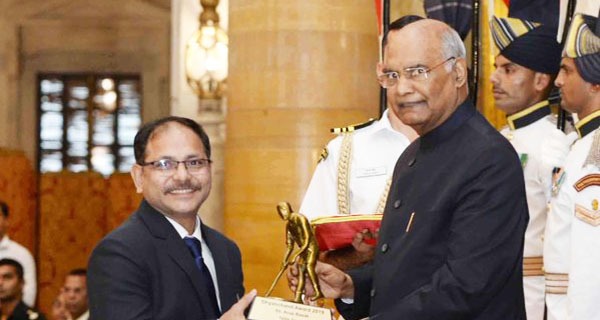KOLKATA, India: National table tennis coach Arup Basak had no liking for the sport as like any Bengalis during his time, he was more attracted to football.
“I used to play para football at Narkeldanga,” recalled Arup, Bengal’s first national TT champion.
He went to create history by beating Chetan Baboor to become first national champion from the state when the tournament was hosted here in 1994.
Football was a big draw for Basak
But before he took to the sport, TT was a big no-no for Arup, who spent most of his time in bikeler (afternoon) para football with friends.
Narkeldanga, which lies between the traditional North and opulent Salt Lake in the east, is a middle-class colony where football was the be-all and end-all sport for the youth in the 70s and 80s.
“Football helped me a lot to remain fit. The running and feints helped me to improve movements in TT,” the 45-year-old said in an exclusive interview to www.khelupdates.com from Mumbai, which is his second home now.
While Arup’s liking for football remain intact, his elder sister Chaitali thought otherwise.
“My sister was a member at Narkeldanga Sadharan Samity Pathagar, where Botonda (Jayanta Pushilal) introduced TT camp in 1983.
Basak owes it to her sister and Pushilal
She came to know about Botonda and felt that I should join his trainign camp,” said Basak, who’s now one of the coaches at the Maharashtra franchise team in Ultimate Table Tennis League (UTT).
“Initially, I was not happy at all. I did not like indoor sports. My passion was football. But I fell in love with the sport due to Botonda. Ami onar contribution bhulbo na (I won’t forget his contribution in my career),” added Basak .
While Arup joined Pushilal’s coaching centre, he didn’t quit football.
“I never gave up para football though I used to be regular at the TT trainings,” he said.
Coaching, his second innings
Arup has been busy in coaching since 2011. The beginning was in his then office PSCB.
Following impressive show in the Inter-institution championship next year, he was called up in the national coaches’ panel. He also coached the national team at the 2016 South Asian Games, where India won seven gold and five silver medals.
“I had worked with Ferenc Karsai. But I felt I had learned most of the modern things from Jayanta-da some 30 years ago. He was ahead of his time,” Arup said of Pushilal, former Bengal and India coach.
“The modern game has changed. The size of the board and balls has increased. The top players now rely on power than applying variety of spin. In our times, the game revolved around the spin,” he added.
India’s chances at 2020 Olympic Games
Basak feels both India men’s and women’s teams will qualify for the Tokyo Olympics.
“The way Sharath Kamal and Gnanasekaran Sathiyan are playing, I’m sure they will book a ticket for Tokyo. Anthony Amalraj, Harmeet Desai and Manav Thakkar are fighting for the third spot.
“Manika Batra, Madhurika Patkar, Ayhika Mukherjee and Archana Kamath will be in the fray for women’s team. I think among them three will definitely qualify,” said Basak, who received this Dhyan Chand Award for his contribution to table tennis.











